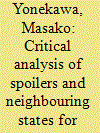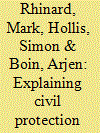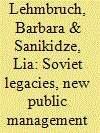|
|
|
Sort Order |
|
|
|
Items / Page
|
|
|
|
|
|
|
| Srl | Item |
| 1 |
ID:
141446


|
|
|
|
|
| Summary/Abstract |
There is a profound disconnect between the practice and scholarly study of security in Europe. The 2010 Internal Security Strategy added disasters such as forest fires, earthquakes, and floods to the list of European Union (EU) internal security concerns, expanding on the more traditional anxieties over militaries, border protection, and the effects of poverty. This article explores how evolving practices of disaster response, a policy area once separate from EU security discourse, have become part of the EU's wider security provision and with what implications. Based on interviews conducted at the Directorate-General (DG) for Humanitarian Aid and Civil Protection (ECHO), it provides a detailed study of three EU disaster response practices – monitoring, training, and information co-ordinating – and their circulation to the wider field of EU internal security provision. It uses this case to outline that new understandings of what it means to “voluntarily co-operate” in European security projects have been radically under-theorized.
|
|
|
|
|
|
|
|
|
|
|
|
|
|
|
|
| 2 |
ID:
131345


|
|
|
|
|
| Publication |
2014.
|
| Summary/Abstract |
Using Stephen J. Stedman's concept of spoilers as the main analytical framework, this paper offers insights into the failure of the United Nations peacekeeping mission in terms of civilian protection for a lengthy period in eastern Democratic Republic of the Congo. This failure arises not only from peacekeepers' failure to fully analyse the ambiguous status and relationship of spoilers and neighbouring states that are hostile to the peace process but also the United Nations' and peacekeepers' continuing support of spoilers and neighbouring states in three areas of implementation: military integration, military operations, and complacency regarding the chronic culture of impunity for key spoilers. Such support calls into question the neutrality of mediators and of the United Nations. The vicious cycle of violence created by spoilers and neighbouring states is likely to continue unless the United Nations develops appropriate preventive and proactive measures.
|
|
|
|
|
|
|
|
|
|
|
|
|
|
|
|
| 3 |
ID:
120836


|
|
|
|
|
| Publication |
2013.
|
| Summary/Abstract |
In recent years the European Union has taken a number of steps towards improving civil protection cooperation in Europe. European leaders regularly declare the importance of boosting cooperation to prepare for and respond to disasters and emergencies afflicting member states. Those declarations have been accompanied by a flourish of policy activity, the building of new structures, and even treaty changes. On the surface, this little-known area of European integration appears to be proceeding with great success. A closer look, however, reveals significant gaps between member states' general expressions of enthusiasm and problematic cooperation in practice. We draw upon public goods theory to explain why this might be the case; more specifically, we identify likely game-theoretic obstacles to cooperation in different areas of the civil protection field. We evaluate our theoretical propositions by examining the current state of cooperation in marine pollution response, chemical contamination management, and flood response. We find that cooperation success in practice corresponds generally, but not perfectly, with the predictions of public goods theory. Our findings offer a nuanced view of civil protection cooperation in Europe and illuminate options for improved cooperation in the future.
|
|
|
|
|
|
|
|
|
|
|
|
|
|
|
|
| 4 |
ID:
099793


|
|
|
|
|
| Publication |
2010.
|
| Summary/Abstract |
The remarkable increase in European security and defence integration in the past decade has presented a challenge to traditional integration theories. Although they remain relevant, these theories fail to take full account of the changing security architecture of Europe, which includes the rise of transgovernmental networks (TGNs). With a focus on EU civil protection, this article critically examines established definitions of TGNs and investigates how these networks influence the supranational and national levels of security cooperation. Findings point toward the emergence of an alternative form of European security governance that addresses the lack of authority in EU security policy.
|
|
|
|
|
|
|
|
|
|
|
|
|
|
|
|
| 5 |
ID:
127678


|
|
|
|
|
| Publication |
2014.
|
| Summary/Abstract |
The article studies agencification and commercialisation within the Georgian police, specifically the Protection Police Department as the successor organisation of the old extra-departmental guards. Despite ostensibly having been scheduled for privatisation from 2004, this unit was instead expanded and strengthened. Given the centrality of police reform in establishing the Saakashvili government's reformist credentials, this represents a critical case testing the limits of top-down neoliberal reform within the very institution that was seen as its centrepiece. It also shows how neo-managerialist forms of organisation-in particular the public law agency-are used to camouflage what remains, essentially, Soviet-style organisation.
|
|
|
|
|
|
|
|
|
|
|
|
|
|
|
|
|
|
|
|
|